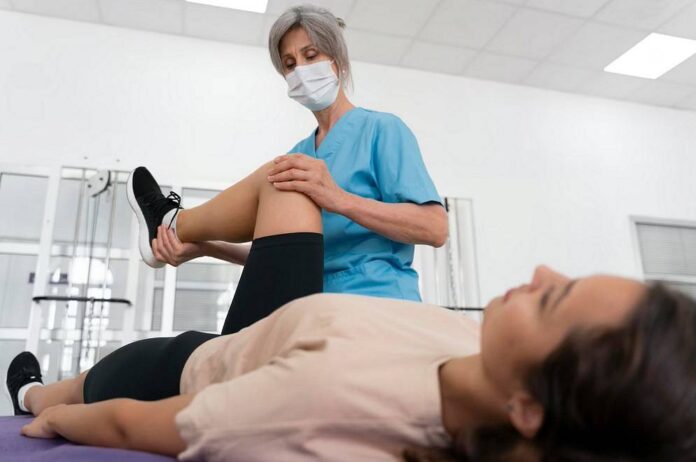Knee replacement surgery, a standard procedure millions of individuals undertake to regain mobility and alleviate pain, is caused by osteoarthritis or injury. While the surgery is a significant step towards a better quality of life, the journey to full recovery often requires active rehabilitation. In this pursuit, a vital yet often overlooked component emerges: iron.
Knee replacement surgery, a standard procedure millions of individuals undertake to regain mobility and alleviate pain, is caused by osteoarthritis or injury. While the surgery is a significant step towards a better quality of life, the journey to full recovery often requires active rehabilitation. In this pursuit, a vital yet often overlooked component emerges: iron.
At Kardiolita Hospital, a renowned medical institution recognized for its expertise in orthopedic procedures, patients undergoing knee replacement surgery receive comprehensive guidance on optimizing their recovery process. As part of their post-surgical care protocol, Kardiolita Hospital advises patients to consider specific medications or supplements, including iron supplements, to expedite the healing and rehabilitation journey. Iron, known for its critical role in wound healing, tissue regeneration, and energy production, is recognized as a valuable aid in recovering from orthopedic procedures.
Iron, essential for carrying oxygen and supporting various bodily functions, may be vital to expediting recovery after knee replacement surgery. Recent research has shed light on iron’s significant impact on healing, muscle strength, and overall rehabilitation outcomes in patients undergoing orthopedic procedures. By understanding the mechanisms through which iron influences recovery and implementing strategies to optimize its availability, medical professionals can potentially enhance the rehabilitation process and improve patients’ post-surgical outcomes.
We must explore iron and its potential to accelerate recovery after knee replacement surgery. We will look at the physiological importance of iron, its impact on wound healing, muscle regeneration, and energy production, and how deficiencies in this mineral can hinder recovery. Additionally, we examine evidence-based strategies for optimizing iron levels pre-and post-surgery, including dietary considerations, supplementation options, and the role of healthcare professionals in monitoring and managing iron status during rehabilitation.
By highlighting the crucial role of iron in the recovery journey following knee replacement surgery, we aim to raise awareness among patients, caregivers, and healthcare providers about the potential benefits of prioritizing iron intake. Ultimately, this knowledge can empower individuals to optimize their iron status and promote faster, more effective healing, ensuring a smoother transition towards a pain-free, active lifestyle.
Iron Deficiency and Its Impact on Recovery
Iron deficiency is prevalent among post-surgical patients, including those undergoing knee replacement surgery. The stress of surgery, blood loss during the procedure, and inadequate intake or absorption of iron can contribute to reduced iron levels in the body. Studies have indicated that up to 50% of orthopedic surgery patients may experience iron deficiency, highlighting the significance of addressing this issue for optimal recovery.
The consequences of iron deficiency on healing and rehabilitation after knee replacement surgery can be profound. Iron is vital in forming collagen, a protein essential for wound healing and tissue repair. Insufficient iron levels can impede collagen synthesis, leading to delayed wound healing and prolonged recovery. Moreover, iron deficiency can compromise the body’s ability to generate new blood vessels, impairing the delivery of oxygen and nutrients to the healing tissues.
Iron deficiency can also affect muscle strength, endurance, and overall recovery outcomes. Iron is crucial for producing adenosine triphosphate (ATP), the primary energy source for cellular function and muscle contraction. Inadequate iron levels can reduce ATP production, leading to muscle weakness, fatigue, and impaired rehabilitation progress. Furthermore, iron deficiency has been linked to decreased exercise capacity, impacting the ability to engage in rehabilitation exercises effectively and hindering functional recovery after knee replacement surgery.
Mechanisms through Which Iron Aids Recovery
Iron supports collagen synthesis and tissue repair, which is vital to recovery. Collagen provides structural integrity to wounds and helps form new tissue.
Oxygen transport is a critical function facilitated by iron. Hemoglobin requires iron for its formation. Sufficient iron levels ensure an adequate supply of oxygen to the healing tissues, promoting cellular metabolism and supporting the energy demands of the recovery process. Iron is also involved in myoglobin production, a protein that stores oxygen in muscles and aids in their regeneration.
Iron contributes to muscle regeneration and strength following knee replacement surgery. Iron is necessary for the production of myoglobin, which facilitates oxygen delivery to muscle fibers. Adequate oxygen supply promotes efficient muscle regeneration and supports the rebuilding of strength and function. Iron is also involved in synthesizing proteins in muscle contraction, enabling optimal recovery of muscle strength and enhancing rehabilitation outcomes.
Optimizing Iron Levels for Faster Recovery
Pre-operative strategies are essential to ensure adequate iron levels before knee replacement surgery. Healthcare professionals may assess iron status through blood tests and recommend interventions if deficiencies are detected. Patients may be advised to address underlying causes of iron deficiency, such as treating any underlying gastrointestinal disorders that may impair iron absorption.
Combining iron-rich foods with vitamin C sources can enhance iron absorption. Nutritionists or dietitians can provide personalized dietary recommendations to ensure patients meet their iron requirements.
Iron supplementation may be considered under medical supervision to address iron deficiency effectively. Healthcare professionals will assess the individual’s iron needs and prescribe appropriate supplements, considering factors such as the severity of the deficiency, absorption capacity, and potential interactions with other medications or supplements.
Addressing potential interactions or contraindications with other medications or supplements is essential. Some medications or substances may interfere with iron absorption or utilization, necessitating careful management. Healthcare professionals should be consulted to determine the optimal timing, dosage, and administration of iron supplements while considering individual patient factors and specific medical conditions. Regular monitoring of iron levels through blood tests is essential to assess the effectiveness of supplementation and make any necessary adjustments.
At Kardiolita Hospital, the highly skilled orthopedic surgeons team stands ready to bring you the relief and rejuvenation you deserve. Countless individuals have found solace in pain-free walking after knee replacement surgery at the esteemed institution.
Their cutting-edge surgical techniques and personalized care have helped numerous patients reclaim their independence and experience the joy of pain-free movement.
Kardiolita Hospital prioritizes your well-being every step of the way. From your initial consultation to post-operative rehabilitation, the dedicated team will guide you with compassion and professionalism. Rest assured; you will be in the hands of experts committed to your success and comfort.

| [donate]
| Help keep news FREE for our readersSupporting your local community newspaper/online news outlet is crucial now more than ever. If you believe in independent journalism,then consider making a valuable contribution by making a one-time or monthly donation. We operate in rural areas where providing unbiased news can be challenging. |



















